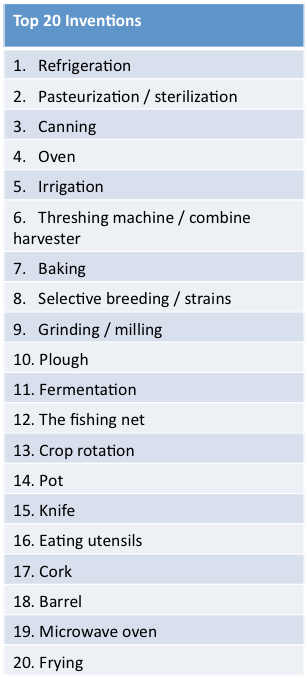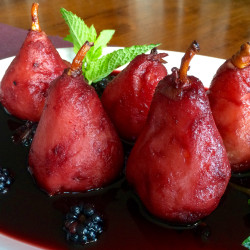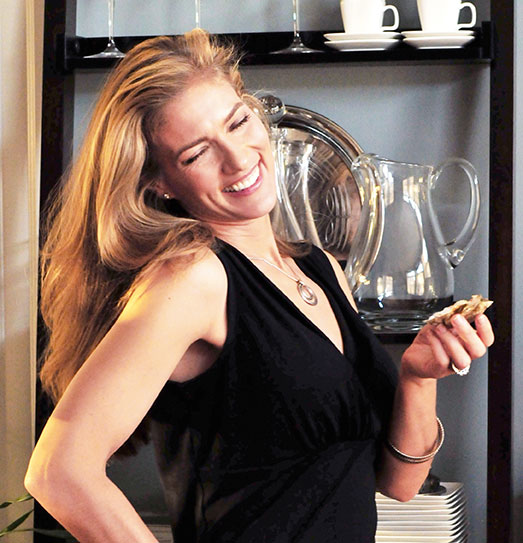Tuesday, September 25, 2012
I have food science and technology on my mind of late, as these are topics we’re currently covering in my Farm to Fork class at Harvard Extension School. A major goal of the class is to examine our current food system and its relation to human and environmental health, so you can imagine that science and technology are at the heart of our discourse. As well, I recently did a television interview on genetically engineered foods (aka GMOs, genetically modified organisms) and their influence on agriculture and public health. These subjects happily provide the opportunity to reference Star Trek every now and again, too.
From our earliest days, human curiosity leading to scientific discovery and the translation of knowledge to invention through engineering and technology is nothing short of profound, forever changing the way we live our lives each day. How we produce and prepare food and drink are just two examples, of course. (You’re reading this on a computer or smart phone, right?)
Whether you’re a Luddite, a technophile, or somewhere in between, there’s no denying that these Top 20 Inventions in the History of Food and Drink from The Royal Society indelibly impact our relationship to food in the 21st century.
The top-rated invention—refrigeration—is one you no doubt take for granted. While the technique is a few centuries old, the large cooling units we have in our home are one of the more recent developments on the list. The refrigerator is indeed a luxury: you or your grand/parents will no doubt recall a time when ice was delivered to the home daily (whence the term “icebox”). Other inventions most likely found in your kitchen include canned foods, an oven, and a microwave. I’ll bet you go very few days without enjoying some of these modern conveniences. No doubt you do a little frying or baking, too, eh? Yup, you’ve got science and engineering to thank for all of it.
Other technologies are quietly incorporated to make our foods safer. Pasteurization, for example—second on the list—is also viewed as one of the greatest public health achievements of the 20th century. Don’t believe the raw milk/juice myth imbued with anecdote, anti-science, and the illogical fascination with all things “natural”: cyanide and nicotine are natural, too, as are most of the pathogens that infect raw beverages. Pasteurization significantly reduces food borne illness. Don’t believe me? Learn more here, here, and here, for starters.
A whopping seven of the top twenty inventions are related to food production, as these agricultural technologies have irrevocably altered the way in which food is grown and produced to feed early human settlements and today’s growing populations. The futurist in me wonders whether genetic engineering will appear on the 22nd century list. Not unlike selective breeding in concept yet utilizing our most advanced methods in microbiology and genetics, my prediction is that it will. (For an FAQ on GMOs, click here, or get started thinking about the issues with this OMG GMO video here.)
Now, how to eat all of this? Sure, you can still use your hands, as many people around the world do in different cultural settings. Or, we can give gratitude to our ancestors for creating eating utensils, which make dining less messy. And, more importantly, were critical for feeding ourselves in our hunting and gathering days. (The knife, that is, not the spoon.) That pot sure does come in handy, too, yes?
Nothing left on the list but to raise a glass to science! And, if we toast with wine or beer we’ve got fermentation, the cork, and barrel for providing the means to enjoy our tasty libation of choice.
Isn’t science awesome? How lucky am I that I’ve been able to practice nutrition research for more than a decade! Let’s remember, however, that “science can amuse and fascinate us all, but it is engineering that changes the world.” (Isaac Asimov,1920-1992).
Let’s just call it a tie and say they both rock.






Thank you, I have been in the raw milk camp for a while, although never have actually consumed it, myself. This information causes me to reconsider. Much to learn.
Thank you for your comment, Teri. And your open-mindedness to learning. It is a breath of fresh air that I truly appreciate.:) The myths about “raw”–unpasteurized–are harmful to the public health. Sure, some people can be okay, as with anything, but studies have shown that raw milk (and juices) carry a much higher risk of foodborne illness compared to those that have been pasteurized. And that’s why it’s on the list. Cheers, PK